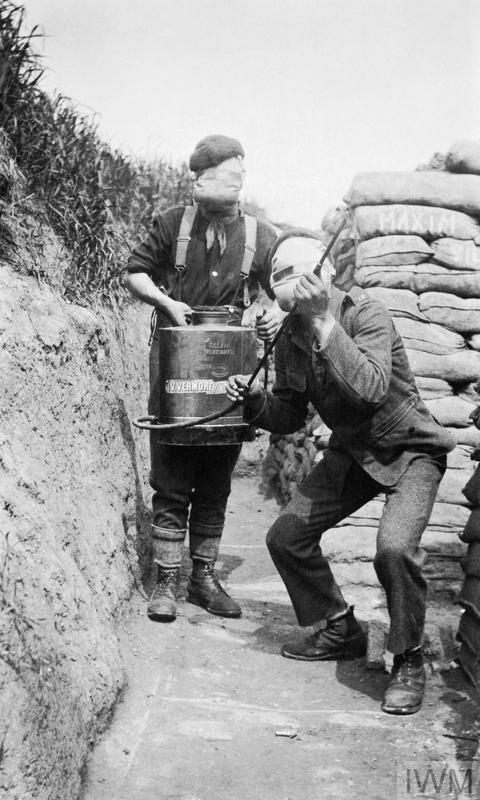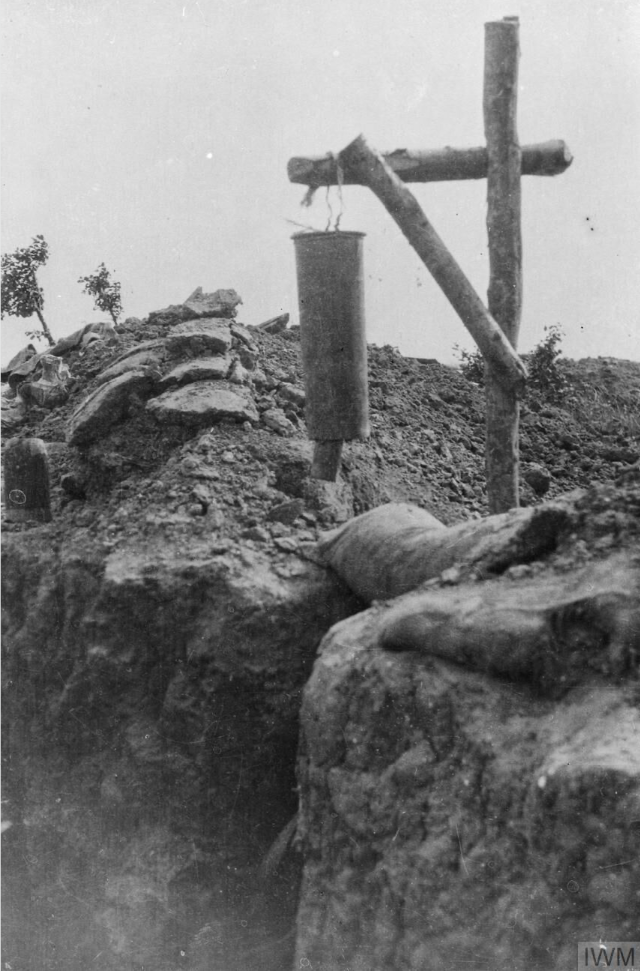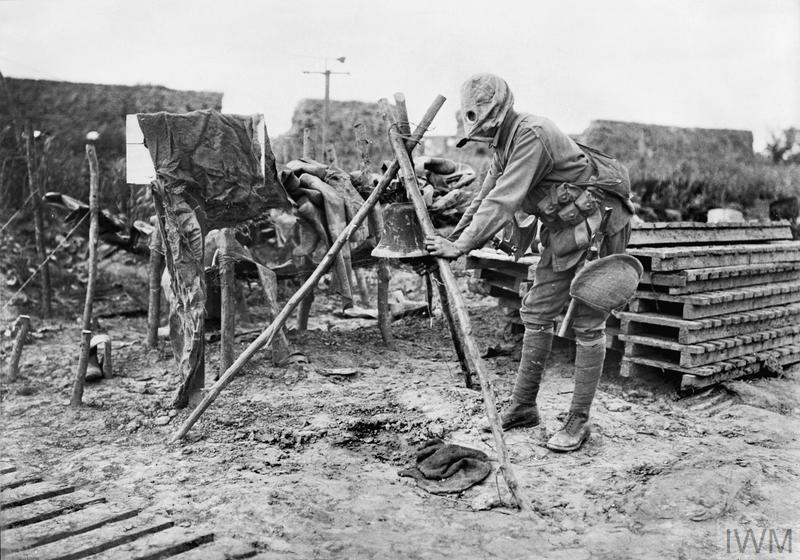Old Front Line
WW1 Podcast with Paul Reed
Gas! Gas! Gas!

In this episode we look at a weapon that came to symbolise the First World War – Poison Gas. We look at the history behind its use, the ‘Birth of Chemical Warfare’ at Ypres in April 1915 and what measures were made to protect soldiers against the gas, as well seeing what can be found of this history on the battlefield today.
Edward Harrison, Inventor of the Small Book Respirator: Edward Harrison on CWGC site.
BATTLEFIELD MAP:
RECOMMENDED READING:




PODCAST EXTRAS: GAS MASKS








PODCAST EXTRAS: GAS ALARMS






Gas the most dreadful weapon, but Dad saw gas ordnance in Italy during WW2.
LikeLiked by 1 person
Absolutely fascinating résumé of a horrific weapon. My great grandfather served with the 9th Argyll’s during the Second Ypres as Regimental Medical Officer and saw the effects of gas first hand which affected him for the rest of his life.
LikeLike
Hello from St. John’s, Newfoundland, birth place of Cluny Macpherson.
Well done on another great episode. I got to stand before the “Brooding Soldier” monument in 2016.
LikeLiked by 1 person
Thank you, Ian. It’s a very powerful memorial!
LikeLike
My father was wounded and gassed in April 1918 about the 18th. He died in 1940 after his lungues eventually gave in, he was 47years old.
LikeLiked by 1 person
Gosh, how tragic 😔
LikeLike
My great Uncle died 9 Aug 1916 : 3rd Canadian Clearing Station – Private A.S. Attrill 23144, 1st Bn., Hampshire Regiment Belguim.WW1 ( age 32 )
LikeLiked by 1 person
He was one of those from Potijze.
LikeLike
August Weier of Independence Wisconsin, was gassed in France. He returned home, married, had 2 children and died in 1927 . His lungs had been badly damaged and he suffered terrible bouts of pneumonia. August was in the 32 Division, AEF
LikeLiked by 1 person
I have a 1WW Gas Attack bell made by Fiddia who I believe were a Birmingham based foundry, I use it as a Town Crier and it is fearsomely loud.
LikeLiked by 1 person
Good grief!! Amazing!
LikeLike
?Thank you Paul. A great podcast.
I took the opportunity to call into the IWM last Sunday to see their gas related collection whilst on my way to joining up with the Leger AQWF group last Monday (10 June).
My second visit to the IWM in a month but always so much to see and take in.
Kind regards
Nicholas Day
Nicholas Day
Sent from Outlook for iOShttps://aka.ms/o0ukef ________________________________
LikeLiked by 1 person
Thanks, Nicholas!
LikeLike
Great episode again. Remembering my own army time when every exercise included one or more hours running around with gas masks. Terrible. And that with modern gas masks and no one really shooting at you.
One thing I always wonder about using gas on the battlefield, I’m interested in your opinion.
In WW2, Hitler didn’t care too much about Conventions. Don’t think I have to specify that. But, as far as I know, he never ordered the use of poisonous gas on the battle field. Could that be because of his own experience after being exposed to gas? Or am I wrong and did Germany use gas (against enemy combatants)?
LikeLiked by 1 person
I think it was the fear of the gas being used on civilian targets that prevented it being used on the battlefield: that would have led to an escalation and both sides dropping gas onto cities, which was the big fear.
LikeLiked by 1 person
Hi Paul. Thanks for another excellent podcast. My great grandfather served with 1/5th Leics and was ‘blightied’ after being gassed at Hill 70 Bois Hugo / Bois Dixhuit in April 1918. He survived and we have pictures of him serving at a gas training unit in Otley in July and August 1918. He passed away from the effects in 1923. Any news on your fourth walking book – the forgotten front which may cover this area?
LikeLiked by 1 person
Thanks, David – I hope to get the book finished next winter.
LikeLike
Hello. I’m currently reading Gas! The Battle for Ypres, 1915, by Steel and McWilliams. It states that during the first use of chlorine gas in April 1915, the German troops were ordered to have fixed bayonets but the rifles were to be unloaded during the subsequent infantry attack. Does anyone know, definitively, why they weren’t allowed to use bullets? I can speculate that it may have been to reduce the risk of fracturing the tanks or reducing the chance of explosion before deploying the gas, or, (less likely in 1915) to save on bullets, but I would be interested to know definitely.
Excellent podcasts, Paul; thanks very much.
LikeLiked by 1 person
Soldiers went over with bayonets fixed and no rounds chambered so they did not accidentally shoot each other in the heat of battle! The tanks were buried in their own trenches so unlikely they would have been firing on them.
LikeLike
Thanks very much for that; much obliged.
LikeLiked by 1 person
Another great podcast and thanks for the book recommendations. Really helpful.
LikeLiked by 1 person
Thank you, Jon.
LikeLike
Listened to this yesterday on YouTube then again on the
OFL platform and as ever, it provides a fresh and interesting perspective.
While Germany definitely deserves a bad rap for breaking the Hague convention, the interest in the use of poison/ debilitating gas by the other belligerents, strongly suggests to me that if Germany hadn’t done it, then another country would have done it instead.
I think that Herr Haber can be euphemistically described as a complex man and perhaps left at that!
As you say, the use of gas has extended throughout the 20th and early 21st centuries. The US had obviously considered using it during WW2, as evidenced by the release of gas over the Italian port of Bari in 1943 after one of their ships carrying it was damaged in a German Air raid.
Yves Buffataut’s book on 2nd Ypres is a useful introduction to the battle.
Thanks again for another excellent podcast.
LikeLike
Very interesting episode as always. The thought of the first gas or any gas attack is horrifying
LikeLiked by 1 person
Thank you, Tim!
LikeLike
Pingback: Questions and Answers Episode 30 – Old Front Line